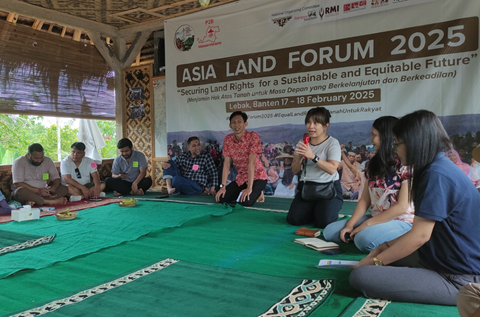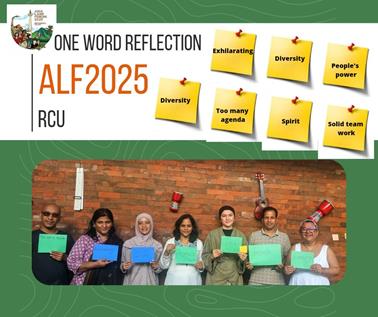Asia Land Forum 2025: A Call for Action on Land Rights and Agrarian Reform
Governments, civil society organisations, and international institutions were urged to take concrete steps toward inclusive land governance.
Jakarta, February 2025—The Asia Land Forum (ALF) 2025 unfolded in Jakarta, bringing together over 500 participants from 14 countries across Central, South, and Southeast Asia. The forum lasted from February 17 to 21. It served as a dynamic platform for civil society organisations, policymakers, and grassroots leaders to deliberate on the critical issues of land rights, agrarian reform, environmental protection, and Indigenous Peoples’ rights.
over 500 participants from 14 countries across Central, South, and Southeast Asia. The forum lasted from February 17 to 21. It served as a dynamic platform for civil society organisations, policymakers, and grassroots leaders to deliberate on the critical issues of land rights, agrarian reform, environmental protection, and Indigenous Peoples’ rights.
Indonesia, hosting the event, stood at a pivotal moment in its history, with the newly elected government under President Prabowo Subianto seizing the opportunity to collaborate with civil society organisations. The forum highlighted a landmark agreement signed between key ministries and civil society groups, a commitment to fast-tracking agrarian reform. This milestone was widely acknowledged as a strategic move towards poverty alleviation and food security, positioning equitable land distribution and transparent governance as urgent priorities.
Throughout the forum, the urgency of resolving agrarian conflicts resonated across discussions. Participants emphasised the need for accurate land data, transparent policies, and inclusive governance. Land disputes, exacerbated by overlapping claims and ambiguous legal frameworks, were identified as significant roadblocks to development. Equitable land redistribution emerged as a central theme, underscoring its role in fostering rural growth and ensuring food sovereignty.
The forum also shed light on the stark gender disparity in land ownership, a persistent issue that continues to marginalise women in many Asian countries. While women play a crucial role in agriculture, they own less than 10.7% of land across the region. Speakers called for legal reforms and gender-sensitive policies to ensure that women gain ownership and control of land resources. Discussions on environmental protection further stressed the need to integrate community knowledge into climate resilience strategies, reinforcing the Free, Prior, and Informed Consent (FPIC) principle for land development projects.
The interconnectedness of land and marine ecosystems also emerged as a critical concern. Experts advocated for a more integrated approach to land-sea governance to prevent displacement and environmental degradation. The importance of direct financing for Indigenous and local communities was also a key takeaway, with calls for international organisations and governments to scale up funding through mechanisms such as the Nusantara Fund and the IPAS Model.
The forum featured powerful insights from regional leaders and experts. Altantuya Tsedenish from NAMAC, Mongolia, spoke about the challenges facing Mongolia’s pastoralists, stressing the need to balance traditional land-use practices with climate adaptation. Iwan Nurdin, representing the KPA in Indonesia, emphasised the necessity of strengthening civil movements across Asia and Africa to counter corporate land-grabbing and exploitation. Human rights officer Romchat Wachirarattanakornkul from OHCHR Asia raised concerns over land defenders’ increasing threats and called for stronger international legal protections. Mongolia’s government representative, Dr. Munkhnasan, reaffirmed the nation’s commitment to sustainable land use and pastoralist rights, particularly in light of the upcoming International Year of Pastoralists (IYRP) in 2026.
 Anu Verma, Asia Coordinator of the International Land Coalition, reiterated ILC’s commitment to empowering vulnerable groups such as small farmers, women, Indigenous Peoples, and youth to protect their land and secure their rights. “The Asia Land Forum provides a crucial space for members to discuss land governance, address challenges, and develop people-centred solutions. It is also a platform for solidarity, where we can unite to support one another in the fight for equitable land rights,” she stated. Verma also highlighted that the forum “brings ideas, experiences, and perspectives to help shape a more equitable future for land governance.”
Anu Verma, Asia Coordinator of the International Land Coalition, reiterated ILC’s commitment to empowering vulnerable groups such as small farmers, women, Indigenous Peoples, and youth to protect their land and secure their rights. “The Asia Land Forum provides a crucial space for members to discuss land governance, address challenges, and develop people-centred solutions. It is also a platform for solidarity, where we can unite to support one another in the fight for equitable land rights,” she stated. Verma also highlighted that the forum “brings ideas, experiences, and perspectives to help shape a more equitable future for land governance.”
As part of the forum, delegates visited three key locations in Indonesia that exemplified the challenges communities face in securing land rights. In the Kasepuhan Jamrud community of Lebak, Banten, Indigenous Peoples continued their decades-long fight for ancestral land recognition. In Gunung Anten village, residents remained embroiled in a 32-year-long land dispute with private corporations. Meanwhile, Sukabumi in West Java stood as a focal point of agrarian conflicts, highlighting the urgent need for policy intervention. These visits provided participants with firsthand insights into the realities of land struggles and the resilience of affected communities.
As the forum drew close, speakers issued a resolute call to action. Governments, civil society organisations, and international institutions were urged to take concrete steps toward inclusive land governance. Commitments were made to monitor land registration progress, facilitate policy dialogues, strengthen legal frameworks, and promote sustainable land management models.
In a rousing closing speech, Beverly Longid, an ILC Asia Steering Committee member, reaffirmed the interconnected nature of land struggles across the continent. “Today, we stand united in reaffirming that Asia’s struggles for land, rights, and self-determination are deeply interconnected. From Indigenous communities defending their ancestral lands to small farmers resisting corporate exploitation, our voices converge in a powerful call: Land is life. Together, we resist. Together, we reclaim. We will secure a just, sustainable, and equitable future for all.”
The Asia Land Forum 2025 provided a platform for crucial discussions. It reaffirmed the urgent need for solidarity, policy reforms, and people-centred governance to secure land rights and promote environmental justice across the region.
